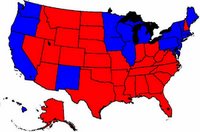 Election-2000
Election-2000This is the red state/blue state election 2000 map. Is this the way it will look again this year? It is hard to say, but many of us hope that it will look much more
blue in 2006.
Election Digest for Texas
Primaries - Tuesday, March 6 is the day for the 2006 primaries in Texas. "Rob", posting at DialyKos, feels that a progressive might win in the Democratic race for Governor. I join with "Rob" in a cautiosly optimistice stance on this question. To quote,
In a 4-way race Gammage has a good chance to defeat Perry. With independents Strayhorn and Friedman in the race there is a golden opportunity for enough votes will be siphoned off from Perry to allow a Democrat to win. Texas. John Kerry got 38% of the vote in Texas in 2000 and Al Gore got 38% of the vote in 2000. Since then the GOP hold on Texas has weakened with scandal after scandal. A strong Democratic candidate such as Gammage has the potential to pull numbers in the 30s by pulling together the Democratic base which would be enough to win in a 4 way race.
Texas Politics at a glance - Optimist "aerialist," another diarist at DailyKos, explores the current Texas political scene in an excellent analysis . It is more hopeful than some I have seen. And, since I am an optimist by nature, I naturally prefer this view. To quote from the post,
We Texas Democrats are being told to focus on the ground at our feet, at the little steps we need to take to rebuild our party by inches, the shuffle-steps of precinct, county and district gains that some day, some decade, will lead us back to the statehouse. . . Meanwhile, we stick together behind Gammage, we work together with Gammage, and we knock on doors, talk to our neighbors, write the editors and gather our friends to tell them the Democratic Party is back and ready to rebuild a Texas we all can be proud of. We'll work for Bob and Bob will work for us, and for all our candidates up and down the ticket. Then - if lightning strikes, and it really might - we can start building our party again with strength at the top AND the bottom.DeLay on the line - Former House Speaker Tom Delay faces a primary election this week in Sugarland, Texas. According to an article in the Washington Post, it will not be a sure thing for him. That would be one of my fondest dreams. To quote,
. . . for the first time -- with DeLay under criminal indictment, rebuked three times by the House ethics committee and linked to former GOP lobbyist Jack Abramoff, who has pleaded guilty to political corruption charges . . . In Tuesday's Republican primary election here, undecided voters . . . could make the crucial difference for DeLay, whose hold on the seat has never been challenged seriously. But emboldened by DeLay's legal and ethical troubles, three Republicans have stepped up to oppose his renomination.DeLay's doing - Slate Magazine reports on the Supreme Court's recent look at Texas redistricting. Dahlia Lithwick wrote an excellent piece about the question as it relates to the various justices' questions and views. The court's decision will have a huge effect on the national political process from now on. I do not feel that this more Republican court will rule against the DeLay redidstricting project. I hope I am not too pessimistic on this question. To quote,
If DeLay emerges as the party's candidate, the road to reelection will not get any
smoother. Former representative Nick Lampson, who has no opponent in the Democratic primary, has been running since last year and, with $1.4 million, has slightly more cash on hand than DeLay, according to the latest campaign finance report. A Houston Chronicle poll in January showed Lampson with a lead over DeLay of eight percentage points.
It will not help DeLay that his district is more Democratic, ironically by his own making. DeLay's legal and ethical entanglements stem from his efforts to redistrict Texas to elect more Republicans to the U.S. House.
It hardly bears saying that the chief object of political power is maintaining and expanding political power. And the framers, who worried about this tendency, drafted Article 1, §4, granting state legislatures the initial power to draw federal electoral districts but allowing Congress to "make or alter" those districts if it wished. While the courts have interceded in cases of racial gerrymandering, the Supreme Court has never been able to clarify (despite loads of mulling) what role it might play in cases of purely political, partisan gerrymandering. The legal problem is, in effect, that partisan politics is fine, until it isn't. But no one knows where that line is, or what to do when it's breached.References:
- Democracy for Texas
- Texas Democrats Group
- State of Texas website
- Washington Post National Politics Section
My current "creative post" at Southwest Blogger is titled, "Yellow is Mellow."
No comments:
Post a Comment